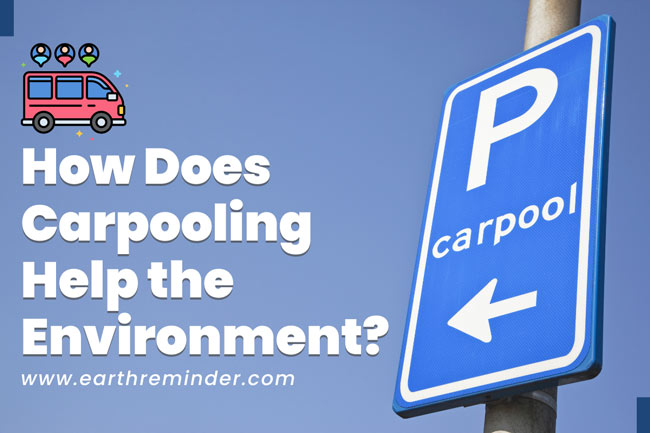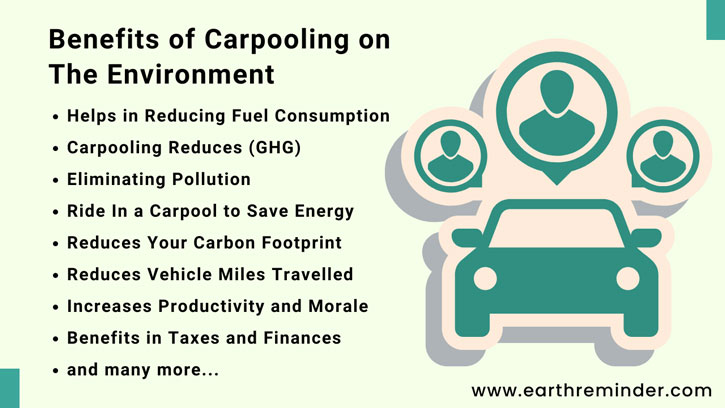How Does Carpooling Help the Environment?
How Does Carpooling Help the Environment?
Table of Contents
- 1 Introduction to Carpooling
- 2 What is Carpooling?
- 3 How Does Carpooling Help the Environment?
- 3.1 Carpooling Helps in Reducing Fuel Consumption
- 3.2 Carpooling Reduces Greenhouse Gas Emissions (GHG)
- 3.3 Eliminating Pollution from The World
- 3.4 Ride In a Carpool to Save Energy
- 3.5 Carpooling Reduces Your Carbon Footprint
- 3.6 Carpooling Reduces Vehicle Miles Travelled
- 3.7 Employers and Agencies Both Benefit from Carpooling
- 3.8 Carpooling Reduces the Need for Extra Land and Parking
- 3.9 Carpooling Increases Productivity and Morale
- 3.10 Carpooling Benefits in Taxes and Finances
- 4 How can the Government and Employers Encourage Carpooling?
- 5 Conclusion
Introduction to Carpooling
Since the invention of cars, trains, and planes, humanity has been looking for ways to conserve energy. We take our cars to work and then use them again to commute back home. The problem is that this two-way commuting process leads to various environmental problems.
The rise in traffic and air pollution has become a severe issue on a global scale. Carbon emissions from vehicles are a substantial contributor to air pollution. Air pollution harms the ecology and all living things on Earth. Animals and humans both need air to breathe and to survive. As a way to reduce this pollution, it is essential to know about carpooling.
Carpooling can be a great way of cutting down on carbon emissions and fuel consumption, both on a personal level and on an industry level.
So, how does carpooling help the environment? Let’s fall in depth to discover more about Carpooling.
What is Carpooling?
Carpooling is when you take a few other people with you to the same destination. In other words, carpooling is a way of reducing the number of vehicles on the road. On a busy weekend, carpooling can be a great and economical way to get around the city.
The opposite would be to have everyone use different vehicles or modes of transportation, which will create several environmental issues.
How Does Carpooling Help the Environment?
People’s travel habits are changing as a result of shared transportation. Below are the benefits of carpooling on the environment.
Carpooling Helps in Reducing Fuel Consumption
Carpooling is an effective way to reduce your gasoline consumption. Even though it may seem like a minor step, carpooling will aid in the conservation of non-renewable energy sources, such as gasoline, diesel, and other fossil fuels.
Compared to a passenger car, which is expected to use 550 gallons of fuel annually, sports utility vehicles typically use 915 gallons.
When all travelers use Carpools to commute, there would be about 780000 fewer vehicle trips per day. This would save 336.53 million liters of fuel each year.
Whether there are one or four occupants, the car uses the same quantity of gasoline. So, if a gallon of gas can almost guarantee that four people get to work on time, why not make excellent use of it?
Carpooling Reduces Greenhouse Gas Emissions (GHG)
Greenhouse gas emissions can be reduced by carpooling due to the reduction in fuel consumption. Carpooling is a simple way to contribute to a greener, cleaner world. Using a shared vehicle reduces carbon emissions. Take into account that when fewer cars are on the road, less pollution is released into the environment.
According to the Environmental Protection Agency, transportation accounts for almost 27% of all greenhouse gas emissions in the United States.
Eliminating Pollution from The World
We are protected from the impacts of noise pollution by our ability to filter out sound. We can prevent the detrimental effects of water contamination by purifying the water we drink. However, we are somehow powerless over the air we breathe. Air pollution is among the worst sorts of pollution in this regard. Carpooling helps in reducing air pollution by reducing the number of vehicles on the road. So, why not reduce it while we still can?
Ride In a Carpool to Save Energy
You can probably figure out how to split the expense of petrol among everyone who commutes with you on a regular basis, allowing everyone to save money on fuel. This method also effectively removes more cars from the road, which improves the environment by lowering your carbon footprint.
Carpooling Reduces Your Carbon Footprint
According to research, a car emits a comparable amount of carbon dioxide into the atmosphere each year, so you may lessen your carbon impact by sharing a car. The cost is significantly reduced by carpooling. If you carpool to and from work, you may cut your transportation emissions by half or more.
Carpooling Reduces Vehicle Miles Travelled
The total number of Vehicle Miles Travelled (VMT), which represents the total distance driven by all vehicles, serves as a proxy for travel demand.
According to various studies, carpooling can reduce regional vehicle miles travelled (VMT) by approximately 1% to 2%, depending on how it affects the other traffic.
Employers and Agencies Both Benefit from Carpooling
Carpooling is an excellent way for employers and agencies to save money. By carpooling, employers can reduce the number of vehicles they need to provide for their employees. They can simply tag all the people coming from the same route to save the extra cost; This, in turn, also reduces the cost of parking spaces they need.
For example, the Seattle (CTR) Commute Trip Reduction program has helped to cut single-occupant car trips by 11% in 2017 (City of Seattle).
Carpooling Reduces the Need for Extra Land and Parking
Employees in public and private sectors can reduce the requirement for parking and capital expenditures by driving less. Parking lots take up a large amount of space. This money can be used for other purposes, such as making infrastructure facilities; This can save the company money on fuel and maintenance costs.
Carpooling Increases Productivity and Morale
Carpooling is a great way to increase productivity and morale. According to anecdotal data, employees who carpool may have less stress during their commute since they don’t have to drive and have more convenience because they can use the High Occupancy Vehicle (HOV) lane and get priority parking at their destination.
Further, when you carpool, you can use the time to catch up on work, listen to audio-books or podcasts, or even just enjoy some peace and quiet. You can also use the time to bond with your fellow passengers.
Carpooling Benefits in Taxes and Finances
Participating in a carpool has financial and tax advantages for employers and employees. However, only a few jurisdictions have implemented carpooling tax credits at the state level and commuter tax benefits.
In terms of finances, Carpooling offers several benefits;
- Firstly, carpooling can help you save on fuel costs. If you carpool with just one other person, you can split the cost of gas evenly between the two of you. This can save you a significant amount of money over time.
- Secondly, carpooling can also help you save on wear and tear on your car. When you carpool, you share the burden of driving with someone else, which can help your car last longer.
- Finally, carpooling can also help you save on parking fees. If you carpool with someone, you can park in their spot when they’re not using it, saving your money on parking fees.
How can the Government and Employers Encourage Carpooling?
Carpooling effectively reduces traffic jams, saves fuel expenses, and ultimately improves air quality. However, it can be challenging to coordinate carpools without the help of employers and government agencies.
Government agencies can support carpooling by developing ride-sharing programs and investing in public transportation.
Employers can encourage carpooling by allowing employees to have flexible schedules and providing incentives for carpooling.
Conclusion
Carpooling is a great way to help the environment. It reduces traffic jams as there will be fewer drivers on the road and saves your money on fuel. We can call carpooling an eco-friendly activity as it reduces your carbon footprint and fights global warming.
Also, carpooling is a great way to meet new people and make new friends. It can be done with co-workers, friends, or even strangers. The most important thing to remember when carpooling is respecting other people’s time and space. It is also a good idea to plan your route ahead of time and make sure that everyone in the car is comfortable with the route.
If you’re not already carpooling, we hope this article has inspired you to give it a try. With a little planning and effort, carpooling can make a big difference for the environment and your wallet.

